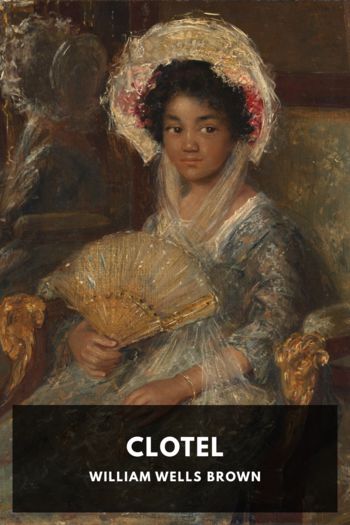Clotel - William Wells Brown (good books to read for beginners txt) 📗

- Author: William Wells Brown
Book online «Clotel - William Wells Brown (good books to read for beginners txt) 📗». Author William Wells Brown
It was wintertime; the day on which he started was the 1st of January, and, as it might be expected, it was intensely cold; he had no overcoat, no food, no friend save the North Star and the God which made it. How ardently must the love of freedom burn in the poor slave’s bosom, when he will pass through so many difficulties, and even look death in the face, in winning his birthright, freedom. But what crushed the poor slave’s heart in his flight most was not the want of food or clothing, but the thought that every white man was his deadly enemy. Even in the free states the prejudice against colour is so strong that there appears to exist a deadly antagonism between the white and coloured races.
William in his flight carried a tinderbox with him, and when he got very cold he would gather together dry leaves and stubble and make a fire, or certainly he would have perished. He was determined to enter into no house, fearing that he might meet a betrayer.
It must have been a picture which would have inspired an artist, to see the fugitive roasting the ears of corn that he found or took from barns during the night, at solitary fires in the deep solitudes of woods.
The suffering of the fugitive was greatly increased by the cold, from the fact of his having just come from the warm climate of New Orleans. Slaves seldom have more than one name, and William was not an exception to this, and the fugitive began to think of an additional name. A heavy rain of three days, in which it froze as fast as it fell, and by which the poor fugitive was completely drenched, and still more chilled, added to the depression of his spirits already created by his weary journey. Nothing but the fire of hope burning within his breast could have sustained him under such overwhelming trials,
Behind he left the whip and chains,
Before him were sweet Freedom’s plains.
Through cold and hunger, William was now ill, and he could go no further. The poor fugitive resolved to seek protection, and accordingly hid himself in the woods near the road, until someone should pass. Soon a traveller came along, but the slave dared not speak. A few moments more and a second passed, the fugitive attempted to speak, but fear deprived him of voice. A third made his appearance. He wore a broad-brimmed hat and a long coat, and was evidently walking only for exercise. William scanned him well, and though not much skilled in physiognomy, he concluded he was the man. William approached him, and asked him if he knew anyone who would help him, as he was sick? The gentleman asked whether he was not a slave. The poor slave hesitated; but, on being told that he had nothing to fear, he answered, “Yes.” The gentleman told him he was in a pro-slaving neighbourhood, but, if he would wait a little, he would go and get a covered wagon, and convey him to his house. After he had gone, the fugitive meditated whether he should stay or not, being apprehensive that the broad-brimmed gentleman had gone for someone to assist him: he however concluded to remain.
After waiting about an hour—an hour big with fate to him—he saw the covered wagon making its appearance, and no one on it but the person he before accosted. Trembling with hope and fear, he entered the wagon, and was carried to the person’s house. When he got there, he still halted between two opinions, whether he should enter or take to his heels; but he soon decided after seeing the glowing face of the wife. He saw something in her that bid him welcome, something that told him he would not be betrayed.
He soon found that he was under the shed of a Quaker, and a Quaker of the George Fox stamp. He had heard of Quakers and their kindness; but was not prepared to meet with such hospitality as now greeted him. He saw nothing but kind looks, and heard nothing but tender words. He began to feel the pulsations of a new existence. White men always scorned him, but now a white benevolent woman felt glad to wait on him; it was a revolution in his experience. The table was loaded with good things, but he could not eat. If he were allowed the privilege of sitting in the kitchen, he thought he could do justice to the viands. The surprise being over his appetite soon returned.
“I have frequently been asked,” says William, “how I felt upon finding myself regarded as a man by a white family; especially having just run away from one. I cannot say that I have ever answered the question yet. The fact that I was, in all probability, a freeman, sounded in my ears like a charm. I am satisfied that none but a slave could place such an appreciation upon liberty as I did at that time. I wanted to see my mother and sister, that I might tell them that ‘I was free!’ I wanted to see my fellow-slaves in St. Louis, and let them know that the chains were no longer upon my limbs. I wanted to see Captain Price, and let him learn from my own lips that I was no more a chattel, but a man. I was anxious, too, thus to inform Mrs. Price that she must get another coachman, and I wanted to see Eliza more than I did Mr. Price or Mrs. Price. The fact that I was a





Comments (0)